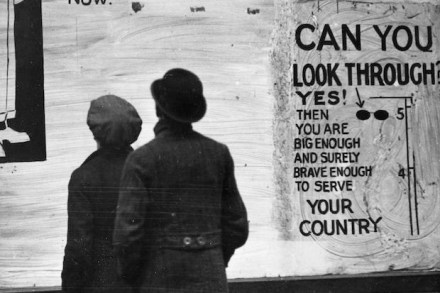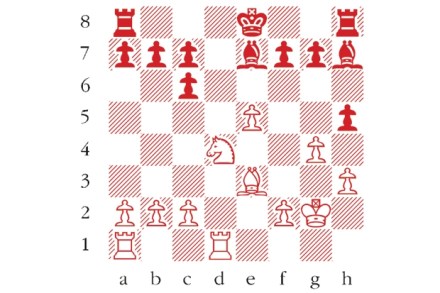The Spectator at war: A clear conscience
From The Spectator, 15 May 1915:


From The Spectator, 15 May 1915:

Here we go again. What effect do you think watching porn and video games have on young men? Yup, they rewire the brain. It’s such a clumsy metaphor – the brain isn’t ‘wired’ in any meaningful sense – that you’d think psychologists and neuroscientists would run a mile from it. Unless, of course they’re Baroness Greenfield, who is a fellow of Lincoln College, Oxford. She was director of the Royal Institution until her post was abolished in 2010, ‘amid claims that there was almost no other way to get rid of her’ (thank you, Wikipedia). Susan Greenfield’s evidence-light claims about the neurological dangers of digital technology have exposed her to much mockery

While cases of Moët & Chandon champagne have been photographed making their way to Downing Street in previous years, the new government appears to have developed finer tastes. Sean Clare, a BBC producer, reports that a delivery of Bollinger champagne – the favoured tipple in of Patsy in the BBC’s Absolutely Fabulous – has arrived at Number Ten Downing Street: A bottle of standard Bollinger retails for around £45 compared to Moët & Chandon which is a bargain at £32.50. However, given that the Bullingdon club has the nickname ‘Bollinger Club’, Mr S suspects it’s only right that former member David Cameron sticks with this brand of bubbly.

Before I got sidetracked by bogus obesity predictions, I was discussing the equally bogus controversy about whether physical inactivity is linked to obesity. It’s now fashionable to argue that exercising doesn’t help you lose weight. As I mentioned in my previous blog post, this is the line taken by Dr Jason Fung, a Toronto-based kidney specialist who runs something called Intensive Dietary Management. He reckons that people are exercising more than ever and yet are becoming fatter and fatter. But, as I argued, it’s simply not true that we’re exercising more as a population. Now let’s look at the effect of exercise on individuals. Fung – who coined the term ‘Calorie Reducation as Primary’,

In this View from 22 podcast special, Fraser Nelson, James Forsyth and I discuss the beginnings of David Cameron’s new Cabinet and how the ministers announced so far demonstrate the Prime Minister’s reticence to shake the boat. Does Michael Gove’s new role at Justice show he’s repaired his relationship Cameron? Will Mark Harper manage to keep the Tory backbenchers in step with Downing Street? Plus, we look at the runners and riders in the Labour leadership contest and why Chuka Umunna and Andy Burnham are the early favourites. You can subscribe to the View from 22 through iTunes and have it delivered to your computer or iPhone every week, or you can use the player below:

From ‘News of the Week’, The Spectator, 8 May 1915: Mr. Lloyd George opened his Budget on Tuesday. We have dealt with it at length elsewhere, and will only say here that “for the present” he proposes no new taxation. Later in the year, however, the whole fiscal problem will have to be reconsidered. If the war lasts till September we shall have a net deficiency of £516,346,000 to make up. The increase of indebtedness, actual and prospective, is very great and very serious, but it is nonsense to talk of it meaning “absolute ruin” and of our being crushed to the earth. A hundred years ago, when the value

It is 70 years since Britain celebrated Germany’s unconditional surrender and the arrival of victory in Europe. Prime Minister Winston Churchill hailed ‘a victory of the great British nation as a whole… against the most tremendous military power that has been seen,’ and he asked ‘when shall the reputation and faith of this generation of English men and women fail?’ It has not yet; and today we remember the freedoms for which they fought and died, which we exercised yesterday. In its 11 May 1945 issue The Spectator‘s leading article was on at ‘The Challenge Ahead’ in the wake of Germany’s defeat: GERMANIA fuit—Germany is a thing that was. The assertion


From ‘The Starving Belgians’, The Spectator, 8 May 1915: The two hundred thousand Belgian refugees who are being provided for in the United Kingdom have made us feel that the refugee question is part of our daily life. We hear of the refugees wherever we go; we see them; our everyday conversation is concerned with them. Yet our own preoccupying experience is but a fraction of the whole question of caring for the Belgians. It is humiliating to reflect how far the vividness of small daily impressions exceeds that of the greater things which have to be imagined. The conditions in Belgium at this moment challenge the imagination to bestir
This week I continue with my analysis of Nigel Short’s recent animadversions upon the differences between the male and female brain and his opinion that women cannot match up to men across the chessboard. The great German poet Goethe once described chess as ‘a touchstone of the brain’; he wrote this, in fact, in the persona of a female character, Adelheid, in his play Götz von Berlichingen. The brainiest person I know is a female triple PhD from Dubai, Dr Manahel Thabet, who is capable of expressing herself in equations way beyond my comprehension. The predominance of male chess players is, in my opinion, not the result of differing

White to play. This is from Polgar-Short, -Buenos Aires 2000. Here we return to the theme of Judit Polgar’s massive plus score against Nigel Short. Nigel’s logical brain no doubt spotted 1 Rxg4 Rf1+ mating. What did Judit play instead? Answers to me at The Spectator by Tuesday 12 May or via email to victoria@spectator.co.uk or by fax on 020 7681 3773. The winner will be the first correct answer out of a hat, and each week I am offering a prize of £20. Please include a postal address and allow six weeks for prize delivery. Last week’s solution 1 … Qxd4 Last week’s winner Nigel à Brassard, London W1

If any of you sees Graydon Carter, the editor of Vanity Fair, walking around with a begging bowl in his hand, it’s because he took me to dinner recently. I sort of went a bit nuts with the wine and the VF chief ended up with the bill. We went to a new Bagel restaurant, Chevalier, a futuristic marvel with great food and wine and even grander prices. New York is no longer elegant, and there are no longer society types dressed to the nines sitting on the banquettes and downing Manhattans. The Jewish ascendancy that downed the Wasps was as elegant as the one it replaced. William Paley, John

The old fishing town faced the sea psychically as well as architecturally. Dressed as pirates, my grandson and I walked down through the steep and narrow streets to the quayside, where we found other pirates. It was still early and there weren’t yet the solid crowds of pirates we were hoping to see. The overcast morning was the last day of the pirate festival, and this fishing town, with a long tradition of privateering, buccaneering, smuggling, piracy and rugby, was slow getting to its feet after two days and nights of carousing. The ticket hut in front of the replica Golden Hind was open for business, however, and there were

In the seemingly endless search for somewhere nice to live in modern Britain, where parking is not subject to martial law, I went house-hunting in the Surrey Hills. I began in the sleepy village of Holmbury St Mary, 15 minutes from where the horses are now kicking their heels up in a lovely livery yard overlooking Dorking. It was a sweet house. But in truth it would only have been practical if one could have built a lift from the roadside through the sheer hillside on which it was built, to cut out the 50 or so steep steps leading to the front door. I should explain that I had


It’s more than four months now since my 75th birthday, but I’m still waiting for a ‘cold call’ from the NHS to ask if I have ‘thought about resuscitation’. This is what the Daily Mail warned me last week that anyone over 75 might now receive. As it so happens, I do quite often think about resuscitation, though only in the sense that I would like to be somehow revived when I fall asleep at my desk. But the Mail was talking about something different: NHS guidelines by which doctors are required to ask their elderly patients if they would like to be resuscitated when they suffered a heart attack

I couldn’t help snorting when I came across an article in the Guardian last week (about the ongoing legal battle to get bridge recognised as a sport) in which the game was described as ‘genteel and physically unchallenging’. What? Bridge is physically exhausting — all that sustained concentration leaves you floored. As for genteel — ha! On the whole, we’re such a boorish and unkempt lot that the English Bridge Union feels obliged to place a slip of paper on every table before a tournament, exhorting players to ‘greet others in a friendly manner’ and — I’m not joking — ‘take care of your personal grooming’. Even the way we
Q. As a writer I find working at home too distracting. I am a longstanding member of the London Library where rules and conditions allow one to concentrate in perfect peace. My problem is that the library has become so popular recently that, to secure one of my favourite desks, I have to arrive at St James’s Square almost as the doors open in the morning. I find the whole palaver of getting out of the house on time with everything I need and then travelling heavily loaded by tube or bike so draining that I am too exhausted to work by the time I get to my quiet desk.

I appeared on Radio 4 a couple of weeks ago to discuss the age-old question of whether political satire is dead. I don’t think it is, but it has lost a good deal of vitality in recent years and the role of satire in the general election campaign is a case in point. There has been no shortage of ‘satirical’ television programmes, but none of them have cut through. The only sign of life has been the flurry of photoshopped images on Twitter that have followed each misstep of the parties’ campaigns, such as Ed Miliband’s decision to carve Labour’s election pledges on to an eight-foot stone slab. If Stanley

It could have been much worse. Someone had pointed out that among the new baby’s ancestors was Queen Violant of Hungary, which would make a splendid name. If that sounds unlikely for a possible queen of the United Kingdom, the wee princess might have been the victim of a suggested cross-cultural gesture by being given the name Fatima, since the present Queen and her heirs are descended from Mohammed through his daughter. Such descent is not unusual, though in this case there are obscurities in the early generations and in later Spanish genealogical connections. Leaving that aside, the name Fatima is also used by Catholics, who take it from the

Home The country went to the polls. David Cameron, the Conservative leader, prepared by going around with his sleeves rolled up. Ed Miliband, the Labour leader, said that his pledges had been cut into an eight-foot slab of limestone. Nick Clegg, the Liberal Democrat leader, took a bus for John O’Groats. Stuart Gulliver, the chief executive of HSBC, said it would take ‘a few months, not years’ to decide whether to move its headquarters out of Britain. Sainsbury’s reported a loss of £72 million for the year, after writing down a fall in the value of some of its shops. Three tons of cocaine, worth perhaps £500 million, were recovered

Four unclued lights can be arranged to form an eight-word excerpt from a quotation (in ODQ). One of these lights provides a cryptic indication of each of the other unclued lights. Each of thirteen clues comprises a definition and a hidden consecutive jumble of the answer including one extra letter; the extras spell the name of the person responsible for the quotation. Across 9 Vessel holding a drink (4) 11 Grin, almost wickedly opposed to pluralism (10) 12 Binding bark, soft (4) 14 Glass, old and hollow, in cases (6) 17 Back artist in assembly (5) 18 Name lord’s province (5) 20